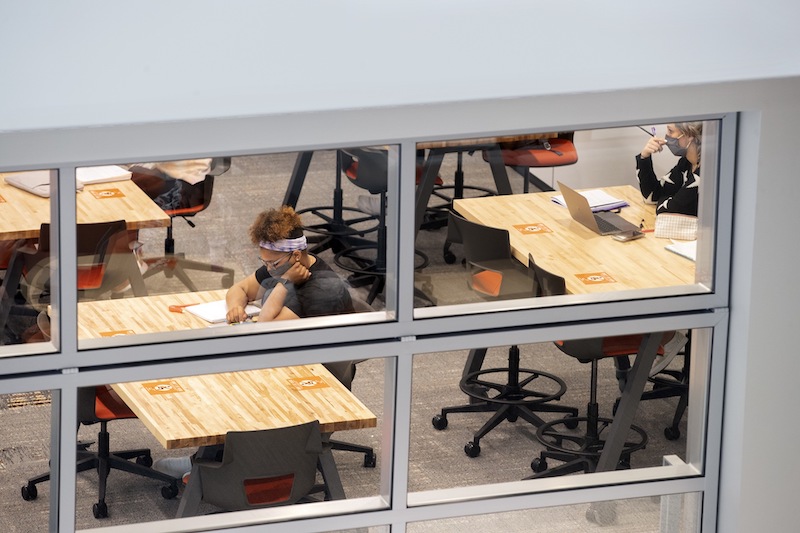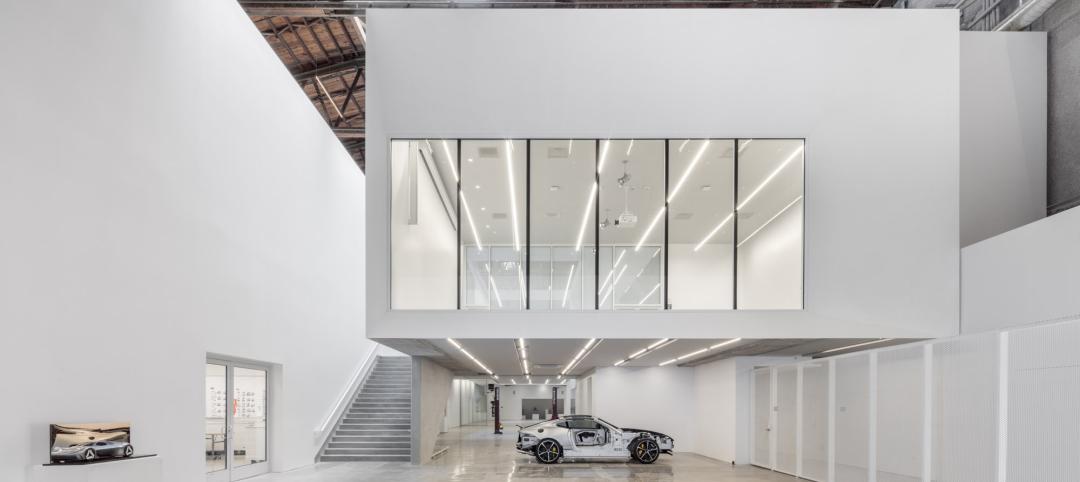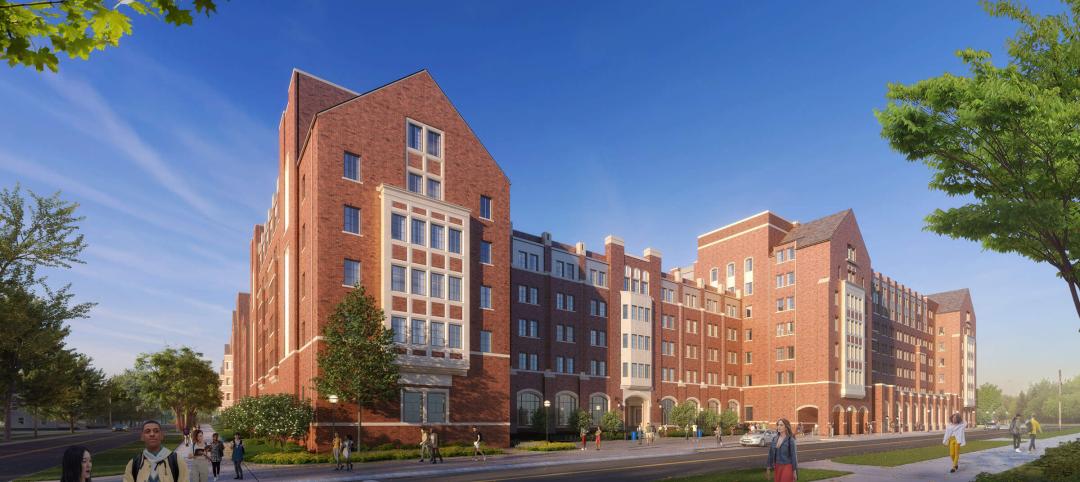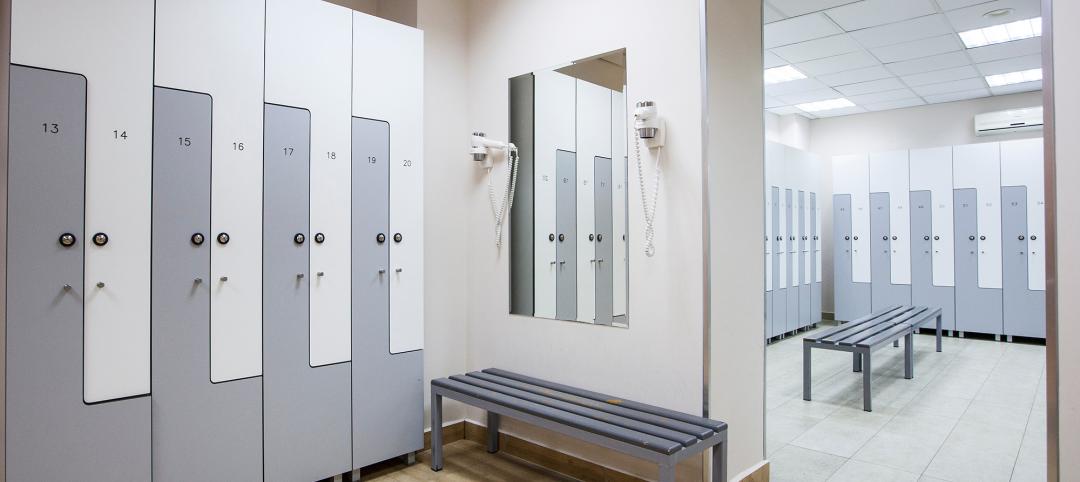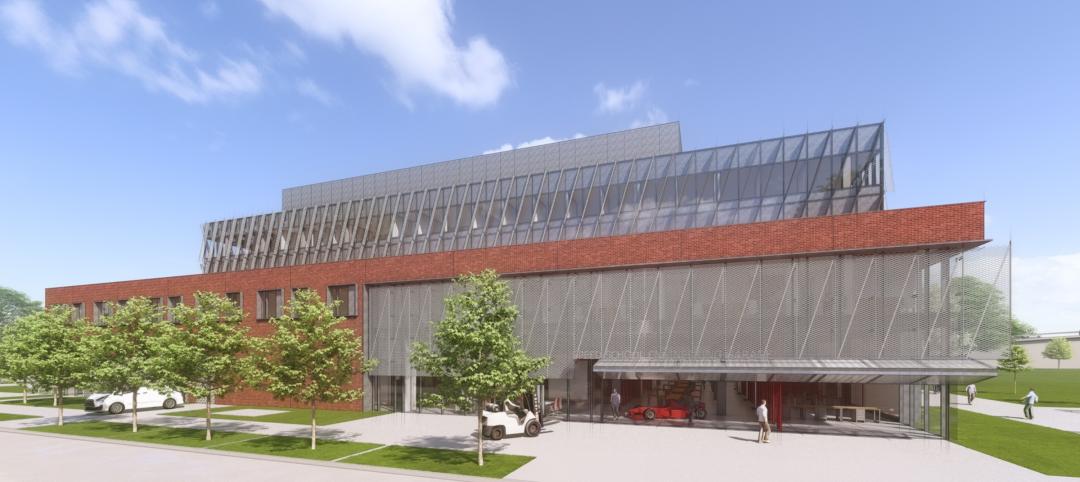Institutions of higher education are under more pressure than ever to demonstrate to students, their parents, and benefactors that a college diploma is worth more than the sheepskin it’s printed on.
To that end, a growing number of colleges and universities are aligning with the research, science, and business sectors that have more input into these schools’ programming, curricula, and even their built environments.
Case in point: In Ohio, Bowling Green State University’s recently opened Robert W. and Patricia A. Maurer Center, the new home for the school’s Allen W. and Carol M. Schmidthorst College of Business. This 50,000-sf building represents a new era for the college, an incubator for study and collaboration that resembles a modern workplace, with the goal of preparing students for real-world careers.
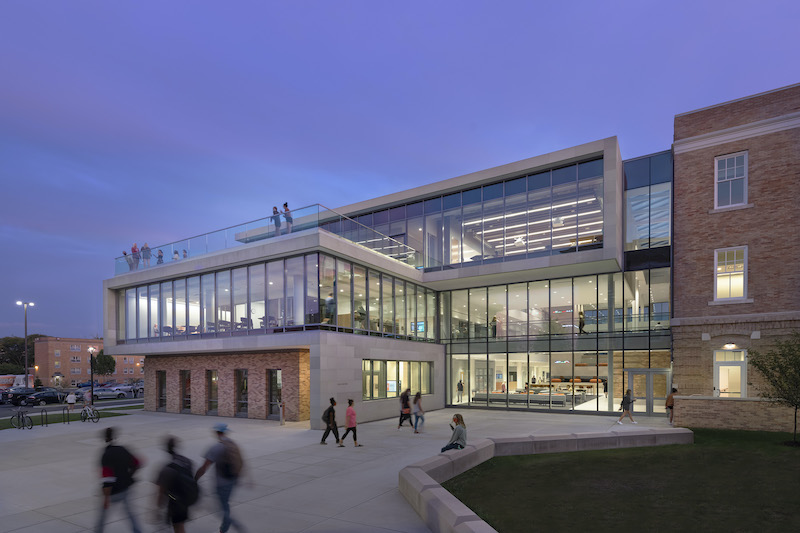
The 50,000-sf Maurer Center is designed to mimic a real-world work environment.
Bowling Green was a leader in this academic-business nexus even before Maurer Center was constructed, as more than 70% of its students have jobs by the time they graduate, says Jessica Figenholtz, AIA, LEED, Associate Principal and Higher Ed Lead with Perkins and Will, the design architect on this project. BD+C interviewed Figenholtz with P&W’s design principals Bryan Schabel and Joseph Connell.
The project’s Building Team included The Collaborative (AOR, construction administration, landscape), Mosser Construction (GC), Schaefer (SE), Wiss, Janney, Elstner Associates (building envelope) ESA Engineers (CE), and JDRM Engineering (ME engineer, technology).
A VARIETY OF STUDY ENVIRONS
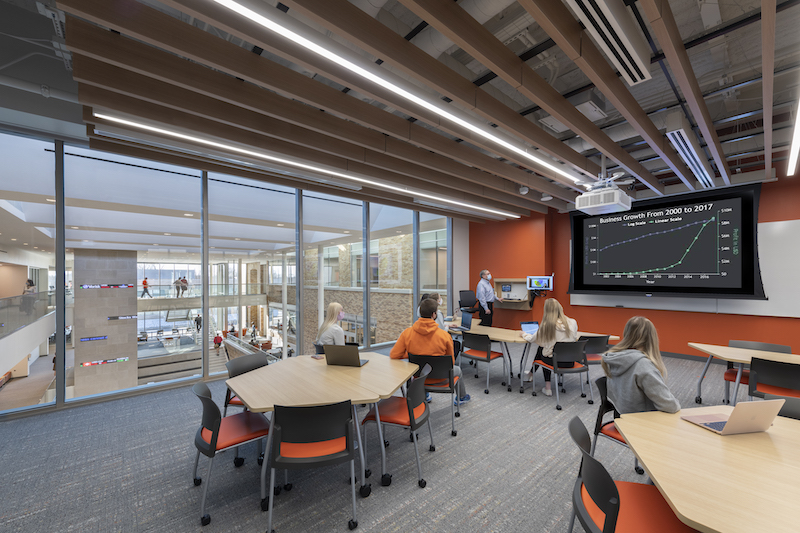
The building's classrooms and faculty offices are encased in glass for greater light and transparency.
The business school, which is currently in hybrid learning mode, had its ribbon cutting last September. It includes more than two dozen ways for students to work and study. There are meeting areas of different sizes and on different floors throughout the facility. The design team created a flexible kit of parts that can change as business needs change. Connell points out that the building’s first floor includes two maker spaces, one of which can expand to 2,200 sf, where students can pitch ideas to companies and investors within a combination lounge-conference room setting.
Classrooms with moveable walls and modular furniture allow students to work together easier. There are wall-less cut-out areas on each floor. Classrooms and faculty offices are enclosed by glass walls for greater accessibility and transparency. “The building is designed to create collisions and interactions,” says Schabel.
The biggest change was getting faculty out of their offices, “which required a change in mindset about thinking of offices as castles and places to hide,” says Connell. Figeholtz adds that College of Business Dean Raymond Braun, an attorney, “wanted to shake things up; he wanted the building to reflect the workplace.”
CENTER’S ATRIUM IS A MEETING HUB
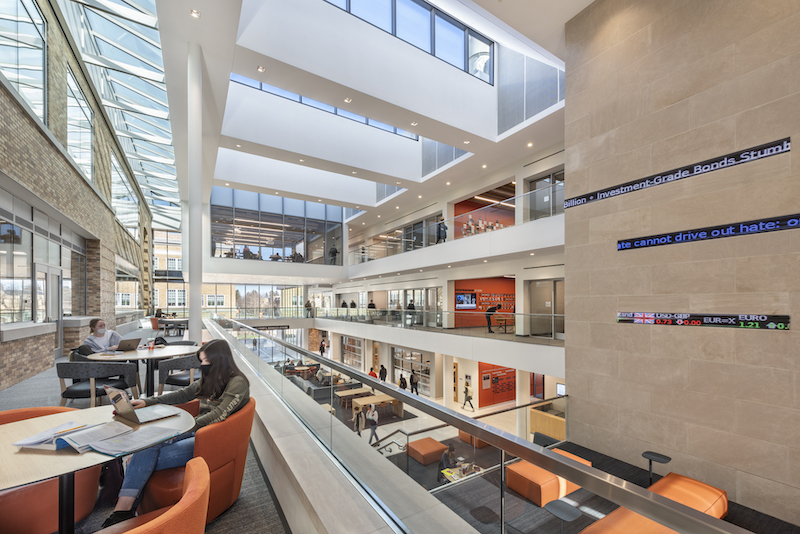
A three-story light-filled atrium includes two maker spaces where students can pitch ideas to investors. One of the atrium's walls is a preservation of adjacent Hanna Hall (below) that contrasts the business school's past and future.
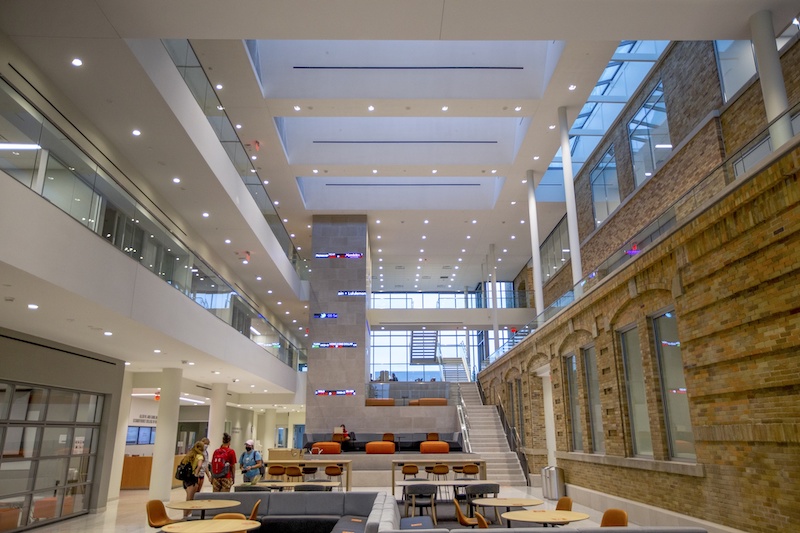
Among the prominent design features in the Maurer Center is its light-filled atrium, a hub that encourages a range of student interactions with peers, faculty and employers in stadium seating and terraced small-group meeting areas. The glazed north façade allows natural light to pour into the atrium.
On one side of the three-story atrium is the existing brick wall of Hanna Hall, an adjacent building that has been completely renovated. Connell says the wall was left standing as a “nod” to the school’ history and as a contrast to the Maurer Center.
The Center also features branding and imagery that tells Bowling Green’s story and its prospective future. “This storytelling is an important part of the recruitment experience,” says Connell. Central to the brand visuals is the business school’s focus on data analytics. A dynamic digital ticker embedded in the main stairway enclosure features the business school’s social media feeds and the latest business news.
This is a 24/7 building (first-floor Starbucks included, of course) that Figenholtz says students now perceive as “a place to be seen, day or night.”
Related Stories
University Buildings | Sep 4, 2024
UC San Diego’s new Multidisciplinary Life Sciences Building will support research and teaching in both health and biological sciences
The University of California San Diego has approved plans for a new Multidisciplinary Life Sciences Building, with construction starting this fall. The 200,000-sf, six-level facility will be the first building on the UC San Diego campus to bridge health science research with biological science research and teaching.
University Buildings | Aug 12, 2024
Planning for growing computer science programs
Driven by emerging AI developments and digital transformation in the business world, university computer science programs are projected to grow by nearly 15% by 2030.
Education Facilities | Aug 4, 2024
A former supersonic wind tunnel becomes a new educational facility for transportation design
The Mullin Transportation Design Center at ArtCenter College of Design in Pasadena, Calif., provides access for full-scale vehicular models, replicating a professional design studio.
University Buildings | Aug 1, 2024
UC Riverside’s student health center provides an environment on par with major medical centers
The University of California, Riverside's new Student Health and Counseling Center (SHCC) provides a holistic approach to wellness for students throughout the UC Riverside campus. Designed by HGA and delivered through a design-build partnership with Turner Construction Company, SHCC provides healthcare offerings in an environment on par with major medical centers.
Student Housing | Jul 31, 2024
The University of Michigan addresses a decades-long student housing shortage with a new housing-dining facility
The University of Michigan has faced a decades-long shortage of on-campus student housing. In a couple of years, the situation should significantly improve with the addition of a new residential community on Central Campus in Ann Arbor, Mich. The University of Michigan has engaged American Campus Communities in a public-private partnership to lead the development of the environmentally sustainable living-learning student community.
Adaptive Reuse | Jul 30, 2024
Empty mall to be converted to UCLA Research Park
UCLA recently acquired a former mall that it will convert into the UCLA Research Park that will house the California Institute for Immunology and Immunotherapy at UCLA and the UCLA Center for Quantum Science and Engineering, as well as programs across other disciplines. The 700,000-sf property, formerly the Westside Pavilion shopping mall, is two miles from the university’s main Westwood campus. Google, which previously leased part of the property, helped enable and support UCLA’s acquisition.
Designers | Jul 29, 2024
Inclusive design for locker rooms: Providing equitable choice and access
SRG designers pose the question: What would it look like if everyone who wanted to use a restroom or locker room could?
Smart Buildings | Jul 25, 2024
A Swiss startup devises an intelligent photovoltaic façade that tracks and moves with the sun
Zurich Soft Robotics says Solskin can reduce building energy consumption by up to 80% while producing up to 40% more electricity than comparable façade systems.
University Buildings | Jul 17, 2024
University of Louisville Student Success Building will be new heart of engineering program
A new Student Success Building will serve as the heart of the newly designed University of Louisville’s J.B. Speed School of Engineering. The 115,000-sf structure will greatly increase lab space and consolidate student services to one location.
University Buildings | Jul 11, 2024
3 considerations for designing healthy, adaptable student dining
Amanda Vigneau, IIDA, NCDIQ, LEED ID+C, Director, Shepley Bulfinch, shares three ways student dining facilities have evolved to match changes in student life.


